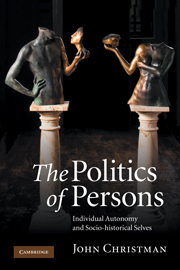9 - The dynamics of social identities
Published online by Cambridge University Press: 15 December 2009
Summary
Discussions in political theory of the importance of social and cultural group membership have been plentiful and multi-faceted in recent decades. This has been spurred by several factors, including growing realization of the effects of globalization, confronting the increasingly multicultural nature of populations in modern democracies, and the continuing effects of identity-based struggles in the 1960s and 1970s in Europe and North America. These discussions gained new energy with attention given to multiculturalism, theories of social recognition, and the politics of difference in recent years. The central issue might be described as asking whether special weight must be afforded to “identity-based interests” on the part of members of particular social groups characterized by commonalities of culture, identity, history, or social position. If such weight must be specified in the design of political principles, how can reference be made to social groups in question while recognizing the multiple differences among members of any such group, without, that is, running afoul of problematic essentialism about social categories which is in tension with the variability of lived experience and the social constructedness of those categories themselves?
This shows how in attempts to articulate this challenge to traditional liberalism, a subtle balancing act must be performed between finding a language which expresses the special weight that identity-based interests allegedly should receive in political principles but without relying on problematically static, reified, or essentialized categories in defining those claims. Theorists in various fields grappling with these issues have attempted to walk this tightrope.
- Type
- Chapter
- Information
- The Politics of PersonsIndividual Autonomy and Socio-historical Selves, pp. 187 - 216Publisher: Cambridge University PressPrint publication year: 2009



